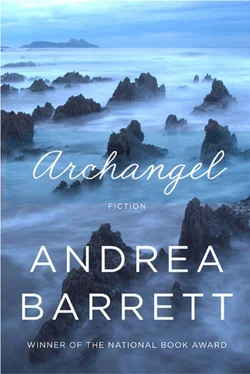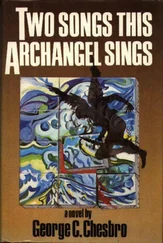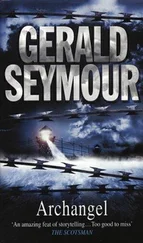“Where everyone was arguing!” Lucinda said brightly. “See, I do listen. Which side”—she turned to Sam—“were you on?”
“Lu cin da,” said a girl named Maud.
“Actually,” Harold said, rubbing his cheek with his thumb, “it was Duncan and Sam, here, who were having a disagreement. But that’s all behind us now.”
Sam tried but failed to catch Axel’s expression, while Duncan changed the subject. But as they were clearing out for the next shift of diners, one of the quieter girls approached Sam and said, “Were you really all quarreling about some experiment while the soldiers were gathering? I would have thought …”
“… that scientists aren’t petty? That we’re not as childish as everyone else?”
“Something like that,” she said, with a surprising smile. “Although I don’t know why I should expect that. I’m Laurel,” she reminded Sam.
Straight brown hair, solid hips, pleasant, but, in Sam’s opinion, unremarkable-looking except for her eyes. Up on deck, amid a crowd of people he didn’t know and safely away from the ones he did, he watched the water move past the hull and listened to Laurel talk about what they’d heard on the radio. The Germans were smashing through Poland and had occupied Kraków. An RAF attack on German naval bases had gone awry. Each wave took them farther from what was going on in Europe. On the Athenia , along with the Americans and Canadians bolting for home, had been refugees from Poland and Romania and Germany who’d managed to get to Liverpool and then fought for berths, only to end up floating in the water before being rescued, if they were among the lucky, by a ship that would bring them back to Britain to begin the process of trying to flee again.
The sky was streaked with mare’s tails to the south, dotted with little round clouds to the north; the last edge of the sun had vanished but some color remained. The open deck was so crowded by now that each of them touched at least one other person. Duncan pushed through like a fox through a field of wheat, nodded when he saw Sam, and kept moving. Duncan wasn’t stupid, Sam thought; he knew some things, including what it meant to be part of a field of science still in its infancy. But he didn’t know the new and enormous thing that Sam and Axel now shared. Sam in one boat and Axel in another, but the same sky, the same rain, the same flares and fears and darkness and dawn. Laurel said something about the windows of a church in London and Sam pretended to pay attention. Why was it, he thought, that even here he couldn’t escape Duncan?

IN 1921, WHEN Sam went off to college in upstate New York, he was sixteen years old and six feet tall, trying to conceal his age behind his size and so lonely that he might have attached himself to anyone. His father, an astronomer at the Smithsonian, had died when he was four; Sam remembered his smell, his desk at the observatory, his laugh. Afterward, his mother had moved them to Philadelphia to live with her parents, who seemed to be nothing like her. He slept in a bed his great-uncle had once used, near a shelf on which, between two photographs of his dead father, a mirror reflected back a face framed by his father’s thick red hair but otherwise very different. His mother’s mouth, her father’s heavy lower lids, two moles on a jaw that must have come from someone on his father’s side. When he touched that face with hands his father’s size but his grandmother’s shape, he felt a huge, hazy, painful curiosity he couldn’t put into words. Like his mother, he was good with numbers, but otherwise his mind seemed to leap and dart where hers moved in orderly lines. Perhaps, he thought, like his father’s? He could only guess.
When he turned eight, his grandfather persuaded a friend to admit Sam to a school so good that his mother, who wrote books and articles about astronomy, was just able to pay the fees. Tearing through his classes, eager for more, he skipped one year and then another. A biology teacher, Mr. Spacek, reeled him in when he reached the upper school, introducing him to the study of heredity. In the empty lab, at the end of the day, he’d enter into Mr. Spacek’s fruit-fly experiments as if he were tumbling down a well, concentrating so intently that the voices rising from a baseball game on the field below, or from the herd pounding around the track, shrank to crickets’ chirps and then disappeared. From the books Mr. Spacek loaned him, Sam finally gained the language to shape what he’d been feeling since he could remember. Who am I? Who do I resemble, and who not? What makes me me , what makes you you ; what do we inherit, and what not?
Mr. Spacek helped Sam translate his curiosity into hypotheses that might be tested, experiments he might perform. He urged Sam to apply to college a year early, and then got him a scholarship and everything else he needed, including two precious books for the journey up the Hudson River. These, along with the sandwiches Sam’s mother had packed him, helped during the bad moment when he confused the motion of the water rushing alongside the train with that of the train itself. Once he arrived at his new refuge, though, he felt fine. The brick and stone buildings were just as handsome as Mr. Spacek had promised, and his room was excellent too, with a big window, two low beds, two desks with lamps and chairs and space for books. Shirts and jackets were already hanging neatly along one half of the closet rod, and these, along with a carton of books and a pair of skis, belonged to a wiry boy who introduced himself as Avery Hayes and asked if he might have the bed away from the window. Sam, who’d never had a close friend, right away liked Avery’s smile and his calm, thoughtful movements.
“Of course you can have that bed,” Sam said. “But are you sure …?”
“Perfectly,” said Avery. “I’m sensitive to drafts. If you don’t mind, I’ll take this desk then, too.”
Which left Sam exactly what he wanted, a view out over the quad, past the beeches and benches and flower beds to the long brick building with limestone lintels, which he’d spotted the instant he arrived: the Hall of Science, the reason he’d come. This was his place, Mr. Spacek had told him, this and no other: because this was the place where Axel Olssen taught.
Mr. Spacek had also arranged for Sam to join Olssen’s section of general biology his first semester, and Axel transplanted Sam so smoothly from Mr. Spacek’s world into his — soon after the first exam, he hired Sam as a bottle washer, brought him into the lab, and told him to use his first name — that Sam hardly felt the shock. The weeks rocketed by, the work Sam wanted to do crowded by other classes, the regimen of the dining hall, compulsory weekly chapel, and the swimming lessons that were part of the physical fitness requirement. The basement pool was dimly lit, slimy under Sam’s feet at the shallow end, where he stood and tried to follow the instructor’s motions. He was the only one that year who didn’t know how to swim at all, and those first weeks of splashing, coughing, breathing in when he was meant to breathe out, and sinking, perpetually sinking—“You’re remarkably dense ,” the instructor said cheerily, trying to support Sam in the water with a hand under his ribs — were humiliating. Thrusting his face back up into the air, Sam lost track of his surroundings and once again was the small, frightened boy who, after his father’s death, was sometimes swept away by tantrums. But then, as soon as he crossed the quad and entered the Hall of Science, everything annoying faded away.
Axel was young himself, just a few years out of graduate school, energetic and delightfully informal; he loaded Sam down with his own books, trusting that he could make sense of the material despite being only a freshman. When he discovered Sam’s age, he laughed and said genetics was a young man’s game — Alfred Sturtevant had been only nineteen, still an undergraduate, when he’d devised the first chromosome map. Calvin Bridges had been an undergraduate too, and a bottle washer, like Sam, when he spotted the first vermilion mutant. Who knew what Sam, the perfect age at the absolutely perfect time, might do? Theirs was a new field, Axel said. A whole new world.
Читать дальше













